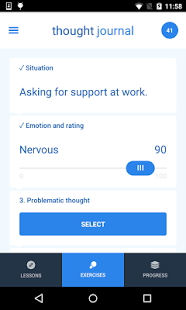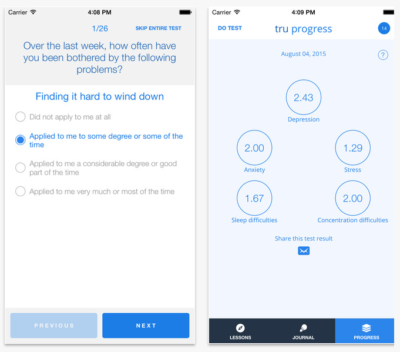Breaking the barriers to mental health support: 5 Questions with TruReach Health’s Jeff Perron
Feeling a bit stressed these days? If so, you’re not alone. A study from the American Psychological Association found that 44 percent of women and 31 percent of men say their stress levels are higher than normal over the holidays. To cope, both genders tend to turn to comfort eating (57% of women; 55% of men) and drinking alcohol (23% of women; 32% of men).
Unfortunately, stress is not strictly seasonal and affects people at all ages, in all stages of their lives – and it starts early. The Centre for Addiction and Mental Health (CAMH) found that more than one in three Ontario high school students report moderate-to-serious psychological distress and young girls are twice as likely as boys to experience a mental health crisis. The 2015 CAMH study also found that the numbers are going up.
“We were also surprised to see this number increase to 34 per cent in 2015 from 24 percent in 2013. That is a 10 percent jump in reported psychological distress in just two years,” said Dr. Robert Mann senior scientist at CAMH and co-lead investigator of the Ontario Student Drug Use and Health Survey (OSDUHS).
There’s an economic cost to depression, anxiety and mental illness. The Conference Board of Canada says that lost productivity caused by workers’ mental illness costs the Canadian economy nearly $50 billion each year. The Board said depression costs the economy at least $32.3 billion and anxiety costs $17.3 billion each year, through absenteeism and presenteeism.
What can be done to help people cope well with their mental health issues? Jeff Perron, founder of the Ottawa-based TruReach Health, decided that technology could help. His TruReach app gives users easy-to-use cognitive behavioural therapy (CBT) lessons, broken down into quick five-minute lessons.
We asked Jeff more about how a mental health app can impact change and what’s next for the growing company in a Five Questions segment.
Question 1. TruReach launched in September 2015. What spurred your decision to create an app centred on mental health?
I’m currently doing my PhD in Clinical Psychology so I see the barriers to mental health support on a daily basis. For me, I feel an obligation to help people get access to mental health support and also help them understand what psychologists do. Apps are such an accessible way of getting people information so it was a no-brainer to create a self-help app to help people deal with depression and anxiety.
Question 2. How has the feedback and response been so far?
I am overwhelmed by the feedback. People have been pretty vocal about how the app helps break down stigma by giving people self-help in a really simple, normalizing way. That was always part of the focus – giving people mental health support in a really down-to-earth way. Everyone struggles with feelings of depression and anxiety at some point so there’s no shame in doing a little self-help to learn how to most effectively deal with those feelings. That’s the tone we always aim for and people seem to appreciate that.
Question 3. What has been the most challenging part of launching TruReach?
The most challenging part has been constantly keeping the word out there and getting people to make the decision to download TruReach. There are so many apps that claim to help with mental health in some way. The challenge is helping people understand which apps are quality and evidence-based. We always want to stand out as an app that is based strictly on science and help people understand why that is so, so important.
Question 4. What has been the biggest surprise you’ve had since launching?
I’m taken aback by how much of a difference straightforward mental health advice can make in people’s lives. The TruReach app consists mainly of quick, easy video lessons. I’ve been surprised at how much people seem to take away from these quick little lessons. It tells me that as a profession, we have a long way to go to demystify and simplify mental health but I think we’re on the right track.
Question 5. What does 2017 look like for TruReach?
2017 looks like working with our partners at the University of Nebraska Medical Center on a successful clinical trial that tells us more about how we can continue to improve the TruReach app. We’re also developing more and more content all the time and in 2017 we’re going to begin adding this content to the app. We want TruReach to be an app where people who want to improve their mental health can come and find all kinds of interesting, evidence-based tools that help them feel better.
The TruReach Health App is available on the Google Play Store and the App Store.





